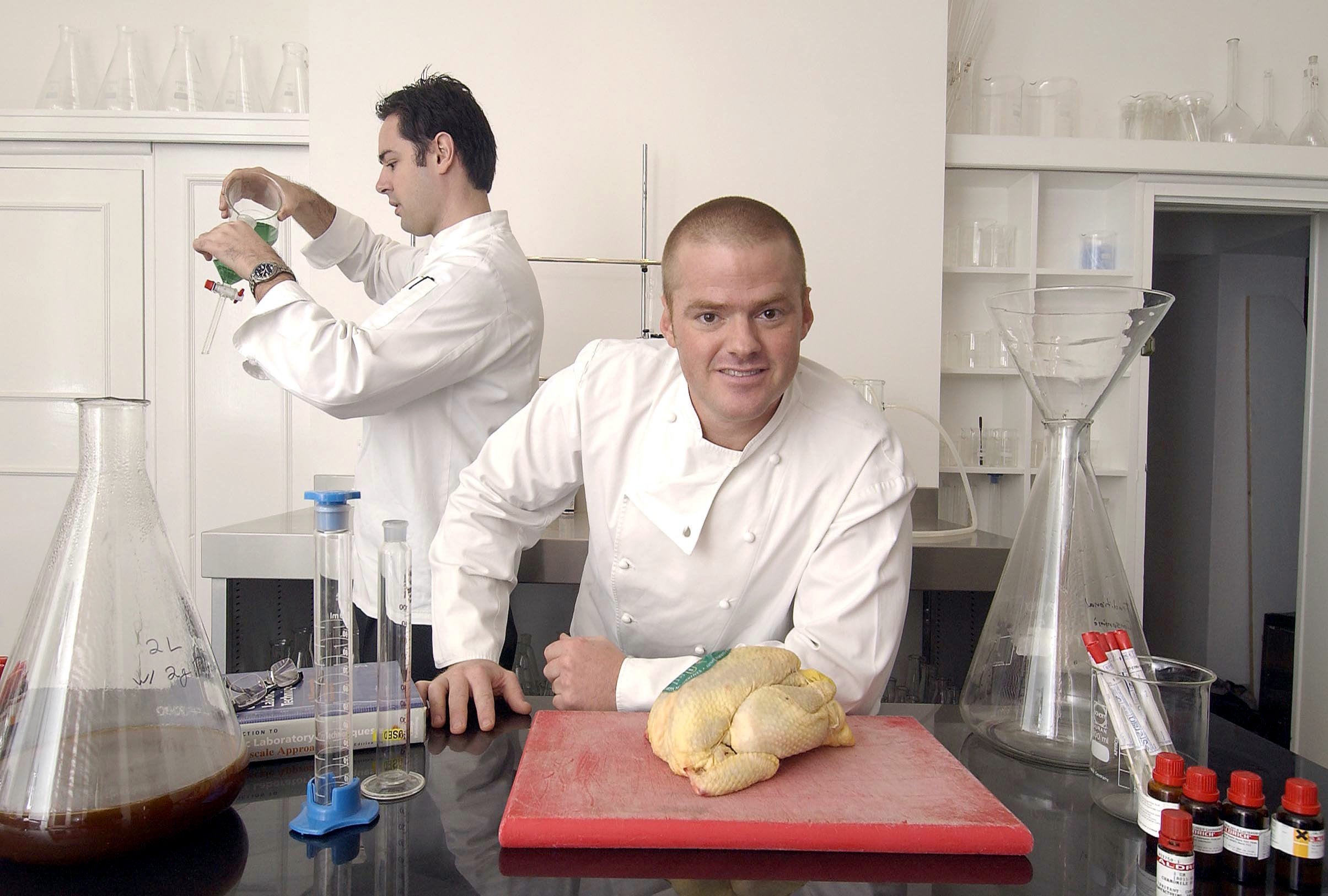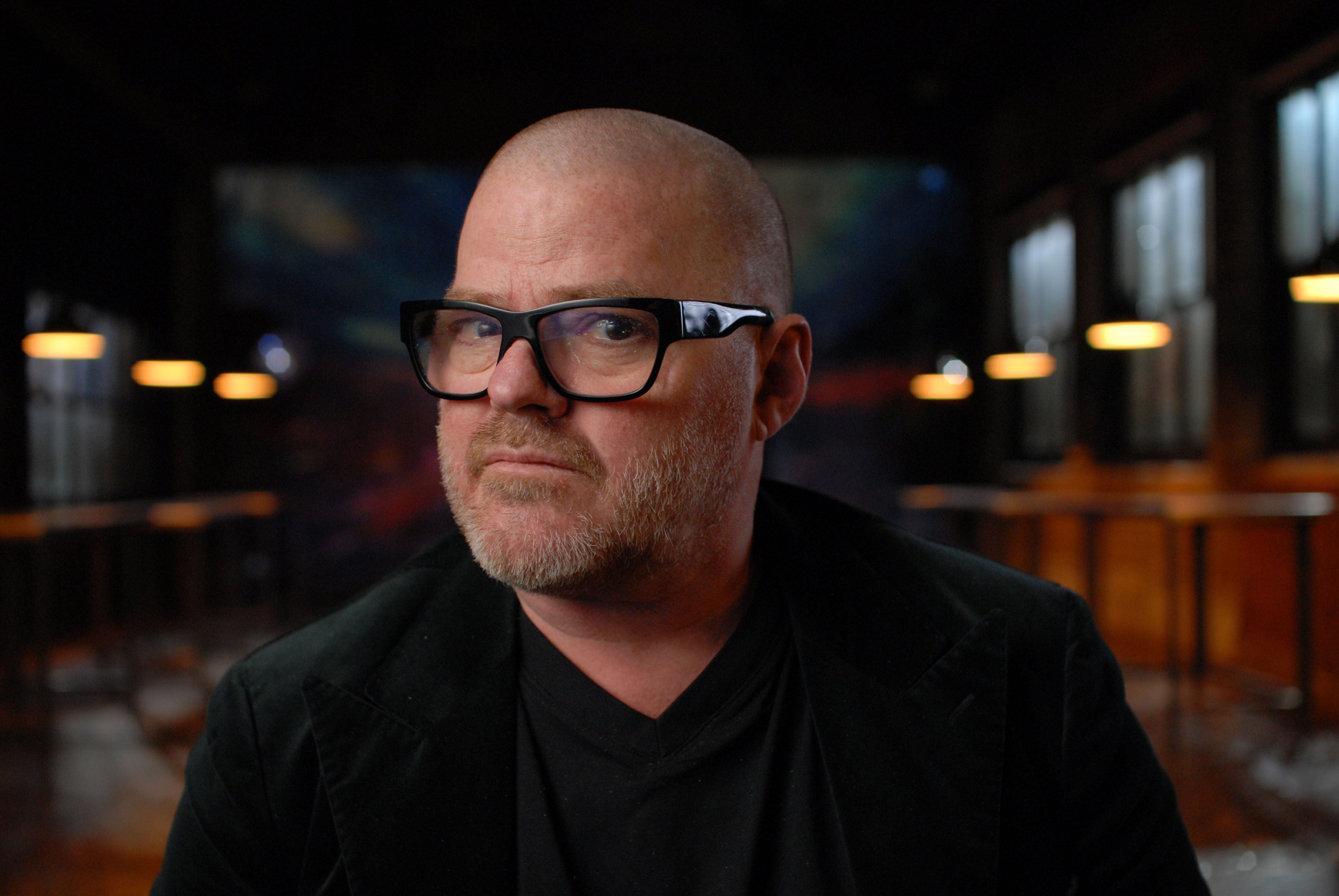It’s the middle of the afternoon in Provence, 35C and rising, and Heston Blumenthal is telling me why he finds The Bear’s kitchen a little hot. “It’s too manic for me,” he says of FX’s award-winning drama about a struggling Chicago restaurant. “I’ve tried it twice. For some reason I just can’t watch it.” The reason, perhaps, is that The Bear’s head chef Carmy Berzatto, and the world around him, is frantic, frenzied and absolutely no fun at all. Blumenthal’s approach to cuisine has always been the polar opposite – playful, joyful, down-the-rabbit-hole. Snail porridge and egg-and-bacon ice cream. Parsnips that taste like a bowl of Frosties. Edible playing cards. Fun.
If you saw Heston: My Life with Bipolar, shown on BBC Two on Thursday, you’ll know that things have changed for the grand ringmaster of British cuisine. In November 2023, Blumenthal was forcibly sectioned following concerns from his wife, Melanie, that his manic behaviour was out of control and he was becoming a danger to himself. After being dragged away from his home by French police officers and firemen, Blumenthal woke up in a psychiatric hospital – “a really dodgy place” – where, two days later, he was diagnosed with bipolar disorder. The diagnosis, he says, saved his life.
Speaking two days before the documentary was broadcast, Blumenthal admits there are nerves about how it might be received. There were some who advised him not to do it, not to speak so publicly about his condition. “What am I nervous about? [The documentary] was quite raw, quite open. There were moments when I thought, ‘Oh s***, should I have said that?’” However, the 59-year-old’s desire to help educate the nation on the disorder – more people suffer from it than dementia in the UK, while it is the only mental health condition where suicide is on the rise – trumped those concerns.
Anyone not keeping up with Blumenthal’s story over the past few months may be in for a shock when they see the film. The cocktail of drugs he was on to control his condition caused him to gain weight, giving the once-lithe chef the bulk of a pub bouncer. The enormous wraparound glasses remain, as does the cropped hair, but Blumenthal’s puckish face, eyes constantly glittering with mischief, is heavy, languid and bearded. His speech has been affected too, and while a reduction in his drugs has improved things, there is still a sluggish delay as he pushes thoughts up the hill (perhaps accentuated by our occasionally buffering Zoom call and the baking Provençal air).
Blumenthal’s career has been defined by the exact opposite of sluggishness, a brain fizzing with possibility and an almost innocent desire to delight the diner’s inner child – Willy Wonka and Charlie Bucket rolled into one. His origin story is polished smooth by this stage. The trip, age 16, to L’Oustau de Baumanière – the Michelin-starred restaurant that he now lives near and regularly frequents – where he was blown away by the theatre of French cuisine. Tellingly, he does not just remember the food, but the “smell of the lavender, the noise of the crickets, the crunch of the gravel”. Charlie had entered the chocolate factory.
Eschewing formal training, Blumenthal worked odd jobs before opening the Fat Duck in Bray aged 29. In August he will celebrate the 30th birthday of a restaurant that has maintained three Michelin stars since 2014. It was in the Fat Duck’s kitchen where he became obsessed with molecular gastronomy, bringing scientific precision and fantastical imagination to the dining process. Over the years he has worked with scientists, academics, illustrators, typographers, filmmakers and psychologists to craft the diner’s experience. While his public persona, aided by those glasses, has always been that of a zany steampunk inventor, his scientific approach is entirely serious. He even co-wrote a study with the University of Reading entitled “Differences in glutamic acid and 5’-ribonucleotide contents between flesh and pulp of tomatoes and the relationship with umami taste”. Try making a Channel 4 series out of that.

He knew for years something was different about him and in 2017 he was diagnosed with ADHD. “I’d looked up everything. Autism. Asperger’s. Narcissistic personality disorder. But I didn’t look up bipolar. No one ever suggested I might be bipolar. Why would they? I didn’t have any idea myself.” Blumenthal believes that his chosen career is the reason that his bipolar disorder was not spotted until he was 57. “Things were compartmentalised by the kitchen,” he says. “Twenty hours a day, focusing on one subject.” The image of the hard-working, eccentric head chef helped, with few questioning his intense work ethic or lack of sleep. The cocaine use, which he says is now “done and dusted”, was deemed part of the territory. Incredibly, Blumenthal would take it to get to sleep.
However, the manic episodes were getting worse, something seen starkly in the documentary with the clip of a 2020 BBC Click interview. The host, Spencer Kelly, merely asks Blumenthal how he is before the chef launches into a long rambling monologue about human evolution. Now, he says, he can recall Kelly’s face, but nothing else about the interview. Melanie will occasionally tell Blumenthal about the things he became fixated on, such as digging holes in his garden as he became obsessed with lavender and the temperature of the soil. Or creating soundscapes out of his daughter’s talking toys. Even in these manic states you can see – from his interest in the finer points of botany, his curiosity about the amalgamation of sound – Blumenthal’s questing mind, and how, when he was well enough, his idiosyncratic brain was able to reinvent the kitchen.
In the hospital, Blumenthal’s curiosity extended to his diagnosis. He did not resist it, or the medication, but instead was intrigued by it, reading several books on the subject as soon as he could. The strangest part, he said, were the hallucinations. “My wife was sitting cross-legged on my hospital bed and I was rambling to her about how the vaping companies were making so much money. And there was no response. I said, ‘Am I boring you?’ And I touched her knee – I actually touched it. I felt it. But she wasn’t there. And I was hearing sounds. Not like a tune in my head, but pieces of music and people talking, outside of my head. And so I read all about it, and that can happen with bipolar.”
Throughout the film, Blumenthal frets about the drugs taking away his creativity, but concludes that it’s still there. “I’m still me,” he says. If anything has changed, it’s his mindset: “I have a more negative perspective on things, where before everything was positive.” That isn’t to say that Blumenthal has become a pessimist, more that, now, every idea he has isn’t greeted with frantic enthusiasm. His livewire mind is still intact. One question I ask about the threat of AI to chefs leads to him musing on whether robots should take over mundane jobs from humans. Another question, on his delusions of grandeur during the peak of his illness (he believed he could solve the global water crisis), takes him on to how Ozempic is affecting the price of jet fuel. During these moments you start to see how crab ice cream came about.
If there was a button I could press, would I turn off my bipolar? Only if I can turn it back on again
Among the documentary’s powerful moments is an emotional conversation with his son, Jack, now 32. The film’s director, Joe Myerscough, asked Blumenthal how his condition had affected his children – alongside Jack, the chef has two daughters from his first marriage, and a much younger daughter from a more recent relationship. Blumenthal had never thought about it. Jack isn’t shy about filling him in, telling him: “You just didn’t want to know anyone else’s thoughts.” Has that conversation, and the diagnosis, changed him as a father? “Yes, it’s changed things,” he says. “For both of us. It’s changed everything. We say we love each other [now]. We take the piss. We laugh more. We speak more. And it’s timely because now I’ve got a granddaughter. She’s 10 months, just starting to stand.”
Jack has also been diagnosed with ADHD, but Blumenthal has said he doesn’t see any signs that any of his children might be bipolar. His sister, Alexis, who died in 2021, was diagnosed with bipolar disorder but “refused to believe it”. Did Blumenthal believe it at the time? “No, I had no idea,” he says. “I couldn’t even see it in myself, right?” Now that he understands that the condition is genetic and can be inherited, Blumenthal wonders if their mother, Celia, who Blumenthal has previously described as a troubled woman, also suffered from bipolar disorder.
Doing the documentary, Blumenthal says, made him vulnerable, particularly when talking about his suicidal thoughts. During the filming of the 2020 Channel 4 show Crazy Delicious, he pondered how to kill himself. And on the day Melanie called the authorities for help, he told her he could see a gun on the table and was thinking of using it (there was no gun). He even began, with typical Blumenthalian relish and attention to detail, to plan his funeral. “Talking about the suicidal thoughts was the hardest bit,” he says. “I didn’t know if I should be saying it. But if I heard someone else talking about their suicidal thoughts, I’d feel they were being strong.”

Any stigma Blumenthal may have worried about within the industry has not yet reared its head. Instead, he has found understanding and, within himself, a greater openness. “My general manager said to me the other day, ‘Are you OK? You don’t seem OK.’ I said, ‘No, I’m not OK.’ I wasn’t OK. I was in a dark place. Not to the level of suicide, but a dark place. I thanked him. I thanked him for saying it.” Would he have treated that question differently before his diagnosis? “I’d have masked it. I’d have more than masked it.” Removing that mask, and the stigma around bipolar disorder, is why Blumenthal is doing all of this in the first place. As well as the film, he is working with Bipolar UK to spread awareness. Blumenthal’s biggest hope is that this will lead to an increase in early diagnosis – currently the average length of time between a first GP visit and a diagnosis of bipolar disorder is a staggering nine years.
As for the future, Blumenthal is cautious. He has recently got back into the swing of things at the Fat Duck – for a long time his anxiety made it impossible for him to fly – spending two or three days a week there and crafting the restaurant’s nostalgic 30th-anniversary tasting menu. He’s happy. “You know, chefs, when they spend time doing TV, they’re never in their restaurants. But I am now. I’m tasting a lot, which I’m really enjoying.” As for television, that is “on the backburner”, but a return to our screens at some point is not impossible. Not least because it’s good for the Fat Duck. “Most of the TV stuff that I did really helped with research and development, even the programmes I did with Tim Peake [Heston’s Dinner in Space] and Alder Hey hospital [Heston’s Mission Impossible]. They all fed into the development of the restaurant. Which was beautiful.”
Before Blumenthal goes to cool down, I ask if he would change anything, if he could go back in time and get that diagnosis at 21 or 45. “Probably not,” he says. “Because I don’t know what would have happened. Someone asked me if there was a button I could press, would I turn off my bipolar? I said, only if I can turn it back on again. Because without it I don’t know whether any of this would have happened.”
‘My Life with Bipolar’ is out now on BBC iPlayer
Bruce Springsteen confirms verdict on Stephen Graham as his father in new film
Heston Blumenthal’s BBC documentary My Life with Bipolar ought to be a wake-up call
Bruce Springsteen biopic trailer leaves fans divided over Jeremy Allen White casting
How Netflix’s powerful Grenfell film sheds new light on the tragedy
Paris Lees on her hit trans drama: ‘I have this compulsive desire to tell the truth’







